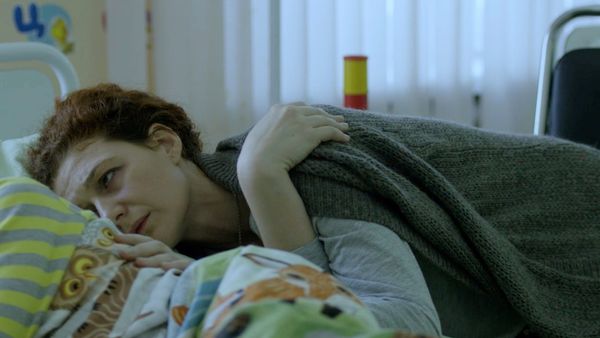Eye For Film >> Movies >> Thursday (2018) Film Review
Thursday
Reviewed by: Jennie Kermode

When one is living with a serious illness - one's own or that of a loved one - for a long time, one inevitably learns a lot about it. The mother we see sitting in a waiting room at the start of this film, imagining herself as a helpless whale trapped in a harbour, may or may not understand the underlying biology of her son's condition but she knows what he needs - what has worked before, what his doctor has recommended, and what the risks are if his treatment isn't handled properly. The trouble is, as far as the staff in this hospital are concerned she's just another member of the public. She has no formal medical training. They see no reason why they should listen to her.
Are they right? Might he have been given substandard care in the past? Might there be a better way to do things? We don't know at first. Even viewers with medical training will find that they have too little information to go on. What is clear is his mother's anguish, her desperation at not being able to get anyone to pay attention to her concerns. She tries to do everything the right way, asking them to contact his doctor or the children's clinic where he has been treated before. Her son can't advocate for himself. It's not just that he's young; it's that he's limp, semi-conscious, increasingly distant from what's happening around him. As the days pass, we see him get worse.

Thursday is based on a true story and although some Russian viewers have dismissed it as political propaganda, others say that it reflects their own experiences all too well. It's likely to be received that way by viewers in many parts of the world. What makes it work, however, is its underlying appreciation of the psychological processes at work in this kind of situation. The staff are calm because they have to be calm - get too attached to people, think of them too much in human terms and it can become impossible to do that kind of work. Everybody has stresses of their own to deal with; in one scene that briefly takes us away from the mother and child, we see the head clinician toying with a gold ring which hints at some drama in her personal life. What is missing is a sense of proportion, of the comparative value of the child's life. Systems and stresses and the shield of bureaucracy have created too much distance. No matter what she does, the mother cannot communicate across this gulf.
Elmira Mirel handles the role of the mother with quiet assurance, carrying her along on a journey from belief in the power of reason to something that is purely instinctive, animal. Director Suro Jr keeps the camera back during the bedside scenes, shifting position like another medical observer. In the waiting room scenes he points it directly at Mirel's face, as if challenging her to produce some display of emotion. What can the mother do - what can she feel - that will make any difference? Her stillness speaks volumes. As her son lies there at risk of losing his life she is losing her personhood. Like the whale, she has been reduced to an inconvenience, everyone already ready to forget that she was here. All this is just another small incident in the vastness of the sea.
Reviewed on: 27 Oct 2019














